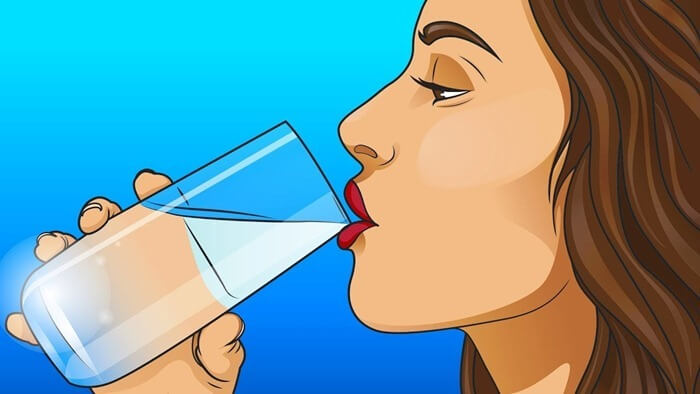Surprisingly, even among competent and highly qualified doctors, stereotypes are widespread that have been passed from doctors to patients for decades. And here are the top 5 most useless and outdated medical advice that you should not follow.
5. Drink at least 8 glasses of water a day
 This myth came to us from abroad, in American medicine it is called the "8x8 rule" - to drink at least 8 glasses of water, one glass 8 times a day.
This myth came to us from abroad, in American medicine it is called the "8x8 rule" - to drink at least 8 glasses of water, one glass 8 times a day.
However, the US National Academy of Medicine offers a different option - 2.7 liters for women and 3.7 liters for men every day. While this looks like a significantly larger volume of water than the 8 × 8 rule, it's important to remember that this recommendation includes total fluid intake (from soup, tea, coffee, etc.).
In other words, many of the drinks and foods we consume contribute to this daily goal, including coffee, tea, juice, milk, fruits and vegetables, just to name a few. While approximately 20 percent of your water intake may come from food, the rest should be from liquids other than sweetened drinks.
So what can affect your water balance?
- Training. Typically, any activity that produces sweat requires fluid replenishment. For the average athlete, this means drinking water before, during and after training, in accordance with personal thirst signals. However, for high-intensity workouts lasting more than an hour, sports drinks are a more effective way to replenish lost electrolyte.
- Climate. Humid climates and high altitudes increase the risk of dehydration and require additional fluid intake.
- Your health condition. The human body quickly loses water during fever, diarrhea, or vomiting.
- Pregnancy and breastfeeding. Both processes require increased fluid intake, as adequate hydration can help prevent hemorrhoids, constipation, and urinary tract infections. Pregnant women should be encouraged to drink about 2.4 liters of fluid every day, and women who are breastfeeding should increase their fluid intake to about 3.1 liters daily.
4. It is imperative to have breakfast so as not to gain excess weight
 Many dietitians repeat the recommendation that you probably heard from your mom as a child. It is imperative to eat in the morning to avoid overeating at lunchtime. This means that excess fat reserves will not be deposited on the waist and hips.
Many dietitians repeat the recommendation that you probably heard from your mom as a child. It is imperative to eat in the morning to avoid overeating at lunchtime. This means that excess fat reserves will not be deposited on the waist and hips.
However, here's what the Australian research team found out after a controlled trial analysis published between January 1990 and January 2018.
- There is no evidence that breakfast promotes weight loss by effectively burning calories in the morning and afternoon and preventing subsequent overeating.
- Skipping breakfast will not make you hungry.
- A meta-analysis of the study results showed a slight difference in weight in favor of participants who skipped breakfast. They were, on average, 0.44 kg lighter than those who regularly ate in the morning.
The study authors concluded from their work that caution should be exercised when recommending a weight loss breakfast in adults, as it can backfire.
3. From working at a computer or watching TV, eyesight deteriorates
 Do you know the feeling of "grit" in your eyes when you work at a computer for a long time? To me - yes, and indeed there is a feeling that the eyes are slowly "collapsing".
Do you know the feeling of "grit" in your eyes when you work at a computer for a long time? To me - yes, and indeed there is a feeling that the eyes are slowly "collapsing".
However, the discomfort of a foreign body in the eyes is caused by the fact that we rarely blink at the screen for a long time. The eye muscles are overstrained, the mucous membrane becomes dry.
If you work at a computer or watch movies for a long time in a poorly lit room, looking at a glare monitor or moving very close to the screen (less than 50 cm), then your vision really "sits down". If you remove these factors, and even try to blink more often, and regularly do eye exercises, then your vision will be normal.
2. Drink antiviral for colds
 One of the most useless advice from doctors. No wonder they say that if a cold is not treated, it goes away in 7 days, and if it is treated, then in a week. There are no antiviral drugs that will speed up recovery from a cold.
One of the most useless advice from doctors. No wonder they say that if a cold is not treated, it goes away in 7 days, and if it is treated, then in a week. There are no antiviral drugs that will speed up recovery from a cold.
However, this cannot be said about all ARVIs (acute respiratory viral diseases). For example, when treating type A flu, some antiviral drugs are actually effective.
1. It is impossible to wet the Mantoux sample
 You probably rolled your eyes after reading the title, like Tony Stark from the famous meme. And they thought: is this myth still in use? Oddly enough, yes. Basically, among the elderly doctors are still of the Soviet school. Sometimes this advice takes on unexpected forms like: you can't wet it only the first day, you can wet it slightly, but you can't swim, etc.
You probably rolled your eyes after reading the title, like Tony Stark from the famous meme. And they thought: is this myth still in use? Oddly enough, yes. Basically, among the elderly doctors are still of the Soviet school. Sometimes this advice takes on unexpected forms like: you can't wet it only the first day, you can wet it slightly, but you can't swim, etc.
Previously, in the USSR, the presence of a tuberculosis infection in the body was detected using the Pirquet test, in which it was necessary to "scratch" the skin and apply a tuberculin solution to it. It was impossible to wet Pirke's sample so as not to "wash out" the tuberculin. And the Mantoux test is done intradermally, but fears about water procedures and incorrect results of an immunological test have been inherited by her.
Despite the fact that you can wet the Mantoux sample, do not rub or wrap it with cling film or plaster. Otherwise, irritation will occur, which will intensify the reaction, and the doctor may consider the test for TB positive.

